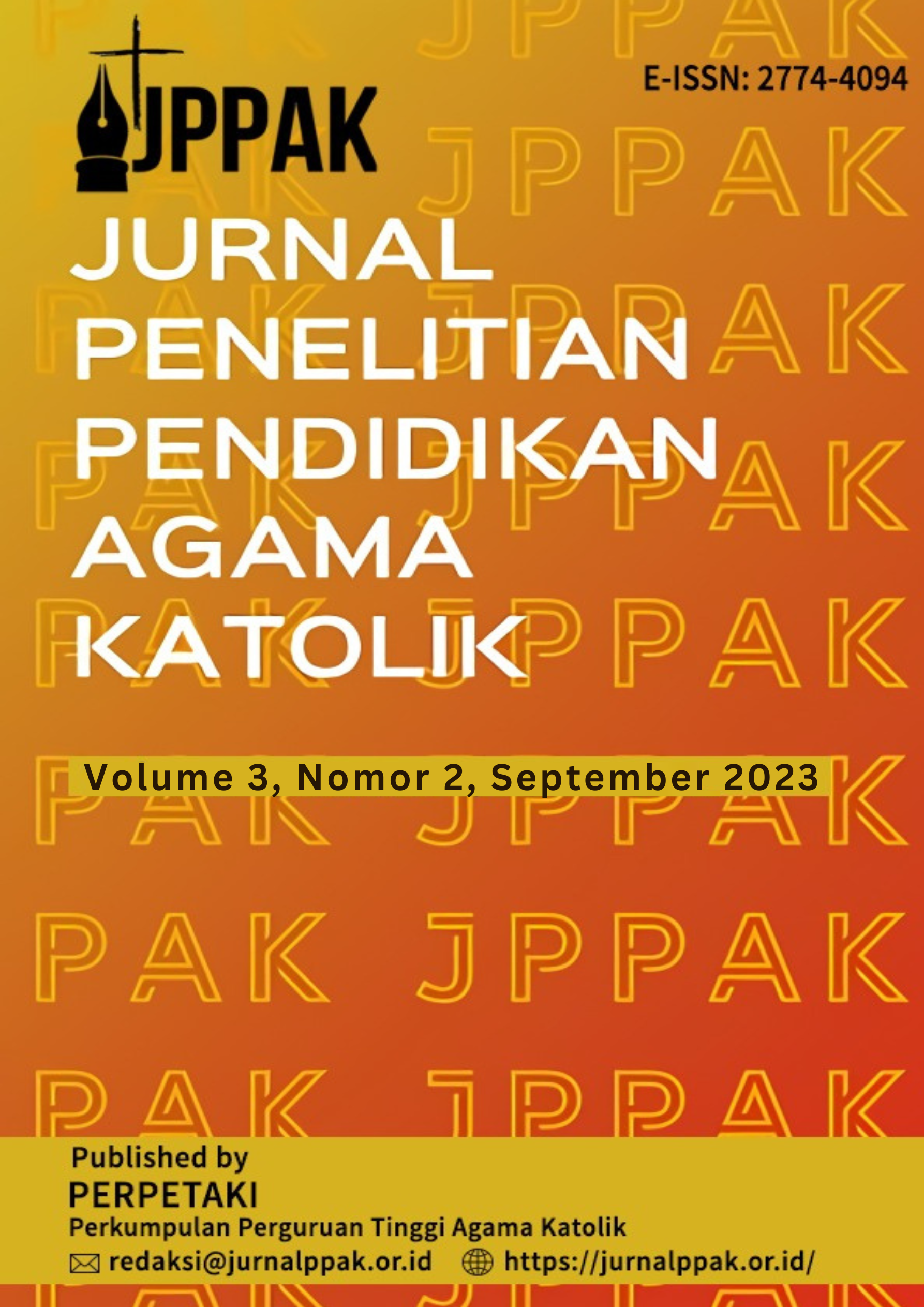Pendampingan Iman Bagi Orang Muda Katolik Menurut Seruan Apostolik Christus Vivit di Wilayah Paroki Sang Penebus Bandar Baru
DOI:
https://doi.org/10.52110/jppak.v3i2.110Keywords:
Faith Accompaniment; Companion; Young People; Christus VivitAbstract
Gereja tanpa anak-anak akan kehilangan masa depan. Begitu juga, tanpa orang muda Gereja akan kehilangan sukacita dan arah. Terkhusus untuk orang muda jiwa yang masih sangat berkobar-kobar dan penuh semangat. Kaum muda yang merindukan dan membutuhkan pendampingan dalam pengambilan keputusan. Pendampingan yang baik memberikan kebebasan tanpa mengikat dan sesuai dengan gaya orang muda. Bukan tugas yang mudah untuk membimbing kaum muda. Christus Vivit adalah salah satu dokumen yang diperuntukkan bagi orang muda dengan keadaan dan situasi yang sudah dipikirkan secara matang. Christus Vivit adalah model yang sangat baik untuk membimbing kaum muda. Kajian ini berangkat dari observasi yang dilakukan penulis di paroki asalnya. Penulis menemukan bahwa kaum muda tidak mengetahui jenis bantuan yang dapat mereka terima atau bagaimana bantuan itu digunakan. Sesuai dengan Anjuran Apostolik Christus Vivit, penelitian ini bertujuan untuk menjelaskan pendampingan iman bagi kaum muda Katolik dan menumbuhkan semangat di kalangan kaum muda di setiap tahapan, khususnya untuk Gereja. Metode penelitian yang digunakan ialah kualitatif dengan 10 responden: 1 Moderator OMK, 1 Pembina OMK DAN 8 OMK. Penulis melakukan wawancara dengan mengajukan sebelas pertanyaan untuk seluruh informan. Hasil penelitian yang diperoleh ialah pendampingan sudah sedari awal dijalankan pendamping (Moderator OMK) bagi OMK. Namun, OMK belum memahami elemen Christus Vivit yang sudah terkandung dalam pendampingan mereka.
Downloads
##submission.downloads##
Submitted
Accepted
Published
How to Cite
Issue
Section
License
Copyright (c) 2023 Monika Br Bangun, M. Marihot Simanjuntak

This work is licensed under a Creative Commons Attribution-ShareAlike 4.0 International License.
Copyright Notice and Permissions
Jurnal Penelitian Pendidikan Agama Katolik offers immediate open access to all its content on the principle to make researches freely available to the public, especially to the scholars, to support greater global exchanges of knowledge. This journal encourages all scholarly authors to allow their research openly available, free access and without time restrictions.
All articles published Open Access will be immediately and permanently free for everyone to read and download. Under the CC BY-SA 4.0 license, authors retain ownership of the copyright for their article, however authors grant others permission to use the content of publications in Jurnal Penelitian Pendidikan Agama Katolik (JPPAK) in whole or in part provided that the original work is properly cited. Users (redistributors) of Jurnal Penelitian Pendidikan Agama Katolik (JPPAK) are required to cite the original source by including at least: the full title of the article, the author's or authors' full name(s), JPPAK as the initial source of publication, year of publication and volume number using a propriate citing method.
Copyright encompasses exclusive rights to reproduce and deliver the article in all form and media, including reprints, photographs, microfilms and any other similar reproductions, as well as translations. The reproduction of any part of this journal, its storage in databases and its transmission by any form or media, such as electronic, electrostatic and mechanical copies, photocopies, recordings, magnetic media is prohibited without consent of Jurnal Penelitian Pendidikan Agama Katolik (JPPAK).
Jurnal Penelitian Pendidikan Agama Katolik (JPPAK) is licensed under a Creative Commons Attribution Share-Alike 4.0 International. (CC BY-SA 4.0)
Authors who publish with Jurnal Penelitian Pendidikan Agama Katolik (JPPAK) agree to the following terms:
- Authors retain copyright and grant the journal right of first publication with the work simultaneously licensed under a Creative Commons Attribution Share-Alike 4.0 International (CC BY-SA 4.0) license that allows others to share the work with an acknowledgement of the work's authorship and initial publication in this journal.
- Authors are able to enter into separate, additional contractual arrangements for the non-exclusive distribution of the journal's published version of the work (e.g., post it to an institutional repository or publish it in a book), with an acknowledgement of its initial publication in this journal.
- Authors are permitted and encouraged to post their work online (e.g., in institutional repositories or on their website) after the publication on JPPAK, as long as it not published on other OJS for it will be treated as plagiarism by plagiarism checker apps. It can lead to productive exchanges, as well as earlier and greater citation of published work (See The Effect of Open Access).












